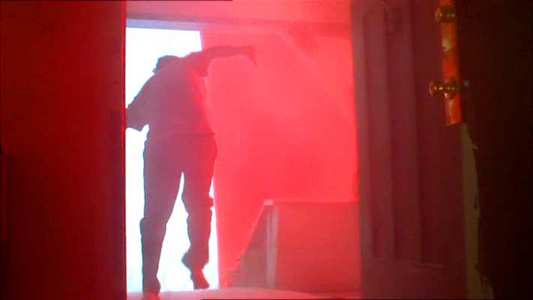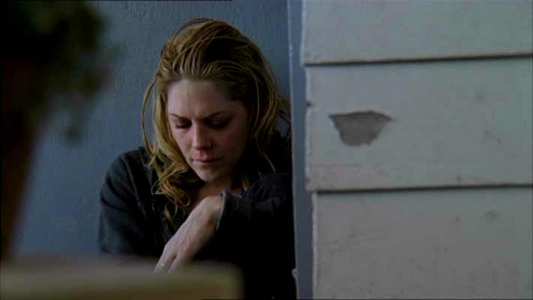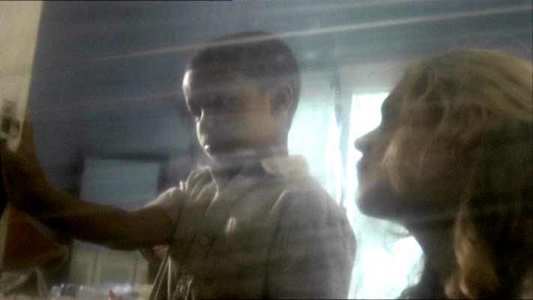Review of Right At Your Door
Introduction
Fans of Fox`s still-good-but-losing-steam-after-five-seasons anti-terrorist smash `24` will find themselves in familiar territory with the metropolitan meltdown first-time writer/director Chris Gorak paints in `Right At Your Door`, known as `Deliver Us From Evil` in the US. On a seemingly average, uneventful morning, at some point between waking to make a fresh pot of coffee and commuting to work, Los Angeleans find themselves in a chemical-biological nightmare when several dirty bombs are detonated in the downtown area of their City of Angels. Chaos swiftly erupts, as victims in the blast radius drop dead and the citizens in the outlying areas are forced into survival mode, relying on crackling emergency radio broadcasts for information on severity of the event, and as the day progresses, whether emergency medical help is on its way to them.
Unlike `24`, the events depicted here aren`t seen through the eyes of a crack team of urban commandos out to save the populace, instead the focus is on the victims, namely SoCal suburbanite couple Brad (Rory Cochrane - `Dazed and Confused`, `CSI: Miami`) and Lexi (Mary McCormack - `Private Parts`, `The West Wing`). Lexi heads for work as usual, but not long after she leaves the bombs detonate. Brad`s first instinct is to race to Lexi`s work to find her, but he finds himself stopped at every turn by heavy-handed police trying to contain the panic. With no conceivable way to reach her and facing the devastating truth that she was most likely caught in the blast radius, Brad seals his home from the outside world with the help of a neighbourhood handyman, protecting themselves against the cloud of lethal ash being blown their way. But later in the day, Lexi, debris-strewn and coughing, arrives on the doorstep and Brad is faced with making a dreadful decision.

Video
Anamorphic 1.85:1, and `Right At Your Door` looks as good as should be expected from a recently filmed movie. Good colours and blacks from a rather limited palette (most of the film takes place in Brad and Lexi`s dust darkened home) although the contrast can be a little low at times, with sharp lines and little in the way of obvious blemishes.

Audio
Dolby Digital 5.1, and while the track is never really tested by the dialogue-heavy piece, there are a few instances of directional implementation. The scoring is very low key and rarely heard, save the accompaniment to the opening credits; this presents some particularly bombastic separation and fullness, and although fleeting, acknowledges that the track has a bit of depth. The only niggle is that much of the tale`s city-wide `bigger picture` is presented through background radio broadcasts which are a little low in the mix, and, unless your A/V gear is set up in a sound-proofed basement and you`ve carte blanche with high volume, may require some fiddling with the knobs on your lugholes as you struggle to hear them clearly.

Features
Director`s Commentary: The track actually features Gorak and David Hughes of Empire magazine. Someone obviously felt the need to trump up the commentary with an analytical eye, yet unsurprisingly Hughes` inclusion does nothing more than turn the yak-track into a Q & A session, with a spot of obligatory brown-nosing. Fairly diverting, though.
`Forearm Shiver`: A 25-minute interview with Gorak in which he talks about where his ideas came from, scripting issues, as well as why the clever working title of "Forearm Shiver", an American Football term, was dropped in post-production.
Film School - tips on making an independent film: Gorak discusses the fineries of low budget film-making for 12-minutes, offering his insights based on his own experience working his way up from the art and production design departments on the set of big name directors.
Alternate endings in script form: A couple of possible resolutions to the film which hardly differ from the actual ending, so it isn`t hard to see why they were dropped.

Conclusion
Nominated for the Grand Jury prize at Sundance, where it was scooped up for worldwide distribution by Lionsgate for a chunk of change in the $3 million ballpark, `Right At Your Door` is a small film with big ideas. While the character narrative remains resolutely on Lexi and Brad, Gorak relishes the opportunity to present an overlay of just how truly unprepared world governments would be in the face of a large scale disaster with such ramifications. Thankfully this never comes across as an attempt to bang home a heavy-handed political message, as after the likes of Hurricane Katrina and the Asian Tsunami, it`s a message that`s already been tragically delivered five by five outside the realm of fiction. Gorak knows where the focus should be, and works to the story`s strengths as he presents a tightly-focused observation of the human damage a catastrophic scenario like this would inflict; a catastrophic scenario he knows seems all too possible in the omnipresent, post-9/11 climate of fear.
Very much to its credit, `Right At Your Door` plays a very downbeat message from the off, beginning with the frenzied mass-terror caused by society changing events in line with Romero`s `Dawn of the Dead` (and even more-so Zack Snyder`s 2004 remake) and Spielberg`s `War of the Worlds`, although this grounded drama is eons away from a genre picture. Just like Romero`s zombie Armageddon and thankfully unlike Spielberg`s alien invasion blockbuster, there`s no crowd pleasing, uplifting denouement or reachable solution pot of gold at the end of a rather grey rainbow. As Brad struggles with his conscience on film, the decisions he weighs are designed to challenge the calibration of the viewer`s moral compass - do you throw caution to the wind, or do you sacrifice the precious last moments with your seemingly doomed loved one to save yourself? It`s a fairly common trait for film-makers to deliberately try and have the viewer transpose themselves into a film`s situations, and in this case it certainly works to a great degree, pulling the viewer in to a film that`s even-paced if a little flat-footed, though scripted well with taught direction, particularly for a debut.
We never see the city in chaos and we never find out who detonated the bombs because, to put it simply, we don`t need to. The peripheral to the Brad-Lexi relationship remains in the peripheral - mostly, showing Gorak has an unflinching level of confidence in the story`s main strand, which he should; it`s punchy and dramatic and ticks all the right boxes despite a dull showing from Rory Cochrane as Brad; coming across as weak instead of helpless and unsympathetically bland, Cochrane doesn`t so much phone in his performance as much as send it via smoke signal from a distant star. On the other hand, the gorgeous Mary McCormack is great value as always. Convincingly strong-willed and charismatic, yet immensely vulnerable, her Lexi doesn`t have much competition for carrying the heart of the film, but lends the film an aura of poignancy nonetheless.
If there are any flaws with his motif, it`s that Gorak isn`t quite sure how to the play with the few incidental character that appear throughout. A young boy wandering the streets, a friend of Lexi`s who may offer her hope, and even to a certain extent the handyman Brad gives shelter to feel as if they`re placed in the story to break up the tension and to inject a little breathing room into an entirely claustrophobic focus - yet they offer little more than a two-dimensional distraction with neither fleshing out or appropriate resolution to add extra dramatic weight to the narrative. Still, it`s an interesting little piece, with the much vaunted twist at the end - more Aesop`s fable than the Twilight Zone - not so much shaking the foundations as serving a fitting end to a thoughtful meditation on morality and responsibility when faced with a frighteningly plausible dilemma.
Your Opinions and Comments
Be the first to post a comment!